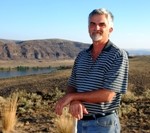Review of Roland Merullo's (Micronesia 1979-80) Lunch with Buddha
 Lunch with Buddha
Lunch with Buddha
Roland Merullo (Micronesia 1979-80)
AJAR Contemporaries
347 Pages
Paperback $16.85
2012
Reviewed by Tony D’Souza (Ivory Coast 2000-02, Madagascar 2002-03)
GOD COMES IN MANY FORMS, so the saying goes, and in Roland Merullo’s latest offering, Lunch with Buddha, the “ultimate” is packaged in the guise of a burly, aging Russian Buddhist monk, Volya Rinpoche, who looks like a sun-burnished field peasant and behaves like a Connecticut Yankee in King Arthur’s Court, only dressed here in a monk’s robe and wandering the American highway. I must confess to not having read this novel’s precursor, Breakfast with Buddha, nor obviously the Dinner with Buddha that is certain to follow. Merullo seems to be striving for nothing less in this series than to lay the literary foundation of his own religion, a hybrid East-meets-West catchall to be named “Buddhianitry” or “Christian-Buddhism”; Volya Rinpoche hasn’t yet decided. The novel ends with a cliffhanger; Volya’s six-year-old daughter, Shelsa, has been recognized by him as the reincarnation of something meant to save the world. She’s secreted at a ranch in North Dakota and gathering around her the first of her disciples, which at this point consist mostly of her devoted Bronxville, NY family.
To get to that pregnant leaping off point, first we have this book, the proverbial lunch, the midday segue between morning’s fiber and evening’s meat and potatoes. As a repast, Lunch with Buddha can only be described as Mediterranean. There’s a lot here, an antipasto buffet of teachings interspersed liberally with anecdotes from the road. The book’s engaging device is an “Odd Couple” pairing of Volya Rinpoche-so thoroughly unaware of America and its pop culture that he seems at times less an innocent abroad than an inhabitant of Plato’s Allegory of the Cave-and the novel’s narrator, Otto Ringling, a middle-aged book editor who has recently lost his wife to cancer. Volya and Otto also happen to be brothers-in-law (Volya’s wife is Otto’s sister), and over the course of their two-man trek from Seattle to North Dakota in a beat-up pickup truck, we are treated to a long-form Laurel and Hardy routine.
In Spokane, for example, Volya and Otto come across a rather interesting set of characters outside a Sprague Street bar. It’s another of those moments when Volya-descendant of a line of Siberian holy men-remains safely unaware of the machinations of the wild world around him, despite his long residency in America:
“Halfway up the block a small collection of souls had spilled out the front door of a brightly lit place called Irv’s. We’d passed it on the way down and seen several muscular, six-foot-tall women dressed in garish heels and an abundance of makeup. I’d decided to say nothing and see if Rinpoche noticed. He did.
‘What is?’ he’d asked when we were safely past.
‘A transvestite bar, I think.’
‘What is that?’
One imagines “God” recognizes at a glance all of his creation, but often Volya feigns naivety, allowing Merullo to render in scene the quirky holy man’s life-lessons. Here, teaching is tempered with laugher as the gentle Russian explains himself in his Slavic accent to the manly cross dressers: “‘Monk,’ he said, and then, pinching the fabric of his robe and holding it toward her, ‘Transwestite, too.'”
The novel recalls William Least Heat-Moon’s Blue Highway in its rather stark descriptions of the landscapes and grim little towns of the American Northwest; we visit dim bars, desperate Indian reservations and cheap casinos, all while Merullo excels at capturing the wide open vistas interspersed with mountains. He thankfully shies from Theroux’s minutia in favor of broad Bill Bryson-esque chuckles.
But the underlying the novel’s humor is Otto’s sorrow at losing his wife; in this way the journey is Otto’s alone. While Volya’s occasional guidance and meditations offer Otto subtle nudges along the path to recovery, for the most part, Otto is simply not ready. His wound is fresh and raw, his loneliness palpable. The book’s Library of Congress catalogue description marks Lunch with Buddha as “Middle-Aged Men” terrain, and while it certainly is that, it is also a novel that makes an earnest attempt at communicating the need for healing in anyone who has experienced loss. That includes a rediscovery of God.
“A person has faith,” Otto meditates mid-way through his journey, “or lacks it. In my brother-in-law, however, this tone, this essence I’m trying to describe, did not feel like faith; it felt, if you will forgive me, like fact. If you asked him how he knew there was a God, or a ‘Divine Intelligence’ as he usually preferred to put it, he’d touch the ground or point to a tree or a cup or a blade of grass, as if challenging you to come up with another explanation for the simple fact of its existence. Or the simple fact of yours. If you asked him what God was like, he would always answer, ‘Don’t know.'”
It’s the journey that makes Lunch with Buddha worth the read, a long drive with God as he searches for God himself; Otto an everyman stand in for us, articulating his constant doubts, as well as his aching desire to know. “Don’t know,” is Volya’s first and last lesson. It’s no surprise then that Lunch with Buddha teaches so much.
•
Roland Merullo (Micronesia 1979-80), is the author of 14 books. Breakfast with Buddha, the prequel to Lunch with Buddha, was nominated for the International IMPAC Dublin Literary Award. Merullo teaches writing at Bennington and Amherst, and has contributed to The New York Times, Outside, Yankee Magazine, Newsweek, and elsewhere. He lives in western Massachusetts with his wife and two daughters.
Reviewer Tony D’Souza’s (Ivory Coast 2000-2002, Madagascar 2002-2003)latest novel, Mule, is at Warner Bros.
No comments yet.
Add your comment